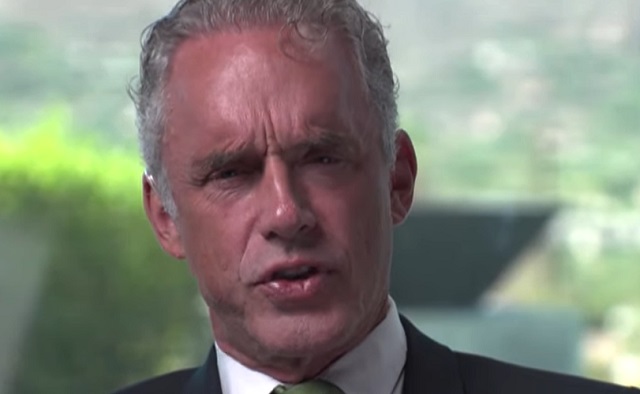International
Jordan Peterson: ‘I would vote for Trump’ as part of ‘revolutionary’ coalition with Elon Musk, RFK Jr.

From LifeSiteNews
In an interview with Piers Morgan, the Canadian psychologist contrasted the former president’s past performance, achieving a ‘decent’ economy and ‘no war,’ against the Biden-Harris record of a ‘complete, bloody world-ending disaster’ in foreign policy.
If he was an American citizen, Dr. Jordan Peterson said he would vote for President Donald Trump in November due to his past performance in office, the “hyper-powerful people” he has gathered around him, and the “grace under pressure” he has exhibited even within the context of two assassination attempts.
The best-selling Canadian author and clinical psychologist was speaking to British TV host Piers Morgan in a wide-ranging interview last Thursday.
“If I could vote in the American election, I would vote for Trump,” he said. “I don’t trust (VP Kamala) Harris.”
“The best predictor of someone’s future behavior is their past behavior,” Peterson explained. “If you’re trying to hire someone and you have documented history of their efforts in precisely the domain that you’re attempting to hire for, and the evidence is clear and valid, you use that in favor of all other predictive markers.”
And with Trump, “we have a documented track record” that includes “decent economic performance” for the nation during his previous term and a “markedly stable international situation” that included “no wars.”
In contrast, the public philosopher observed that under the Biden-Harris administration “we have this terrible, brutal, and I think unnecessary war going on between Russia and Ukraine, which could spiral out of control at any moment, and is highly likely to.”
Since at least May 2023, Trump has promised to end the war in Ukraine within “24 hours” of his potential second inauguration in January. And despite his apparent full embrace of the Zionist agenda, the former president has provided several indications that if elected in November he may bring an end to the genocidal onslaught Israel is currently inflicting upon the Palestinian people.
In late April, the presumed Republican nominee also would not rule out withholding U.S. military aid from Israel in an interview with Time Magazine. After criticizing their “public relations,” particularly the Israeli Army “sending out pictures every night of buildings falling down and being bombed with possibly people (inside),” he was asked whether he would rule out withholding aid, to which he said, “No.”
Additionally, in early June, President Trump appeared to inadvertently make a significant campaign commitment in telling former UFC lightweight champion Khabib Nurmagomedov he would end the war in Palestine.
While attending an Ultimate Fighting Championship event in Newark, New Jersey, Nurmagomedov was heard privately saying to Trump, “I know you will stop the war in Palestine,” to which the 45th president responded, “We will stop it. I will stop the war,” with a video clip of the encounter going viral on Twitter/X.
Secondly, Peterson highlighted what he saw as a very positive development with the former president pulling in “a lot of hyper-powerful people” such as business mogul Elon Musk, former Democrat congresswoman and presidential candidate Tulsi Gabbard, Vivek Ramaswamy, and Robert F. Kennedy Jr., “most of whom would have been Democrats in anything approximating a sane and normal world.”
For the psychologist, this indicates that the otherwise “flamboyant and dominating” Trump does not “tilt too far in the narcissistic direction” otherwise he would not be making these alliances and sharing “the spotlight with the rest of this crew.”
Furthermore, “I would vote for Trump if for no other reason than Musk himself has already agreed to head something like a Department of Governmental Efficiency in the U.S.,” Peterson continued. “Then Kennedy is bringing the public health crisis into the political realm, and both of those two things are revolutionary.”
The former professor also doesn’t believe Trump is pursuing a second term out of ambition since he is “an old man,” has already been president and “he’s as famous as you can get.” His motives are therefore focused on the betterment of the United States, “and that’s part of why he’s building this coalition.”
Morgan went on to comment on Trump’s “genuine personal courage” that he has exhibited within the context of the two recent assassination attempts. Trump’s insistence on getting back up after being injured by the first attempt, “to punch the air defiantly was a remarkable thing to do.” And “more remarkable” was his “being back on stage” just one week later “at another rally with an even bigger crowd, like nothing had happened.”
With regard to the second incident, Morgan marveled that Trump was cracking jokes after this attempt on his life, quipping, “I wish I could have finished my birdie putt.”
“Yes, grace under pressure” is a virtue Trump possesses, agreed Peterson, who went on to assess the quality of the former president’s humor.
“You know, Hitler wasn’t well known for his sense of humor,” he continued. And “you can’t deny this, Trump is a funny bastard. He’s funny.” This includes on social media where he is “impulsive, entertaining, unbelievably cutting and funny.”
“You know, that just doesn’t go well with the tyrannical personality,” the psychologist assessed, “because tyrants aren’t well known for being able to tolerate the court jester.”
“And so, Trump is tough and funny,” he summarized.
Addressing Democratic presidential nominee Vice President Kamala Harris, Peterson applied the same principle, “that previous performance is the best indicator of future performance.”
“We’ve already seen what a Biden administration looks like,” and the “foreign policy has been a complete bloody world-ending disaster under the Democrats,” he said in relation to conflicts in Ukraine and the Middle East.
“The easiest thing to predict is another four years of the same thing,” he concluded.
Artificial Intelligence
Trump’s New AI Focused ‘Manhattan Project’ Adds Pressure To Grid


From the Daily Caller News Foundation
Will America’s electricity grid make it through the impending winter of 2025-26 without suffering major blackouts? It’s a legitimate question to ask given the dearth of adequate dispatchable baseload that now exists on a majority of the major regional grids according to a new report from the North American Electric Reliability Corporation (NERC).
In its report, NERC expresses particular concern for the Texas grid operated by the Electric Reliability Council of Texas (ERCOT), where a rapid buildout of new, energy hogging AI datacenters and major industrial users is creating a rapid increase in electricity demand. “Strong load growth from new data centers and other large industrial end users is driving higher winter electricity demand forecasts and contributing to continued risk of supply shortfalls,” NERC notes.
Texas, remember, lost 300 souls in February 2021 when Winter Storm Uri put the state in a deep freeze for a week. The freezing temperatures combined with snowy and icy conditions first caused the state’s wind and solar fleets to fail. When ERCOT implemented rolling blackouts, they denied electricity to some of the state’s natural gas transmission infrastructure, causing it to freeze up, which in turn caused a significant percentage of natural gas power plants to fall offline. Because the state had already shut down so much of its once formidable fleet of coal-fired plants and hasn’t opened a new nuclear plant since the mid-1980s, a disastrous major blackout that lingered for days resulted.
Dear Readers:
As a nonprofit, we are dependent on the generosity of our readers.
Please consider making a small donation of any amount here.
Thank you!
This country’s power generation sector can either get serious about building out the needed new thermal capacity or disaster will inevitably result again, because demand isn’t going to stop rising anytime soon. In fact, the already rapid expansion of the AI datacenter industry is certain to accelerate in the wake of President Trump’s approval on Monday of the Genesis Mission, a plan to create another Manhattan Project-style partnership between the government and private industry focused on AI.
It’s an incredibly complex vision, but what the Genesis Mission boils down to is an effort to build an “integrated AI platform” consisting of all federal scientific datasets to which selected AI development projects will be provided access. The concept is to build what amounts to a national brain to help accelerate U.S. AI development and enable America to remain ahead of China in the global AI arm’s race.
So, every dataset that is currently siloed within DOE, NASA, NSF, Census Bureau, NIH, USDA, FDA, etc. will be melded into a single dataset to try to produce a sort of quantum leap in AI development. Put simply, most AI tools currently exist in a phase of their development in which they function as little more than accelerated, advanced search tools – basically, they’re in the fourth grade of their education path on the way to obtaining their doctorate’s degree. This is an effort to invoke a quantum leap among those selected tools, enabling them to figuratively skip eight grades and become college freshmen.
Here’s how the order signed Monday by President Trump puts it: “The Genesis Mission will dramatically accelerate scientific discovery, strengthen national security, secure energy dominance, enhance workforce productivity, and multiply the return on taxpayer investment into research and development, thereby furthering America’s technological dominance and global strategic leadership.”
It’s an ambitious goal that attempts to exploit some of the same central planning techniques China is able to use to its own advantage.
But here’s the thing: Every element envisioned in the Genesis Mission will require more electricity: Much more, in fact. It’s a brave new world that will place a huge amount of added pressure on power generation companies and grid managers like ERCOT. Americans must hope and pray they’re up to the task. Their track records in this century do not inspire confidence.
David Blackmon is an energy writer and consultant based in Texas. He spent 40 years in the oil and gas business, where he specialized in public policy and communications.
International
Trump orders 500 more troops to reinforce D.C. after Guard shooting

President Trump moved swiftly Wednesday to reinforce security in the nation’s capital, ordering an additional 500 National Guard troops into Washington after two Guardsmen were shot just blocks from the White House. Secretary of War Pete Hegseth announced the request during a press briefing, describing the attack as a direct strike on the men and women protecting the city. “We will never back down. We will secure our capital. We will secure our cities,” Hegseth said Wednesday, adding that the president directed him to coordinate with the Army and the Guard to surge fresh forces into D.C. He framed the move as part of Trump’s broader campaign to restore order: “The drop in crime has been historic. The increase in safety and security has been historic.”
Authorities say the two Guardsmen — both members of West Virginia’s National Guard, confirmed by Gov. Patrick Morrisey — were armed and on routine high-visibility patrols when a gunman rounded a corner at 17th and I Street NW around 2:15 p.m. and opened fire. D.C. Mayor Muriel Bowser described it as a “targeted shooting,” and Metro Police executive assistant chief Jeff Carroll detailed the moment the attacker “raised his arm with a firearm and discharged it at the National Guard members.” The soldiers were rushed to a hospital in critical condition. Law enforcement from MPD, the FBI, ATF, and the Secret Service immediately flooded the scene. One suspect was detained; officials say there is no evidence of additional attackers, but the motive remains unknown.
The president first deployed the Guard to D.C. on Aug. 11 as part of a sweeping law-and-order push to cut crime and clean up the city, a mission launched after former DOGE employee Edward Coristine — known widely as “Big Balls” — was beaten while thwarting a carjacking. Coristine, now at the Social Security Administration, became something of a symbol inside the administration of the city’s lawlessness.
Wednesday’s shooting comes as Trump’s security initiative faces legal headwinds. Although the Guard is conducting patrols, they are not authorized to make arrests under the Posse Comitatus Act, limiting their role to deterrence and support. D.C. officials sued the administration in September, arguing the deployment is unlawful without the mayor’s consent. A federal judge temporarily sided with the city last week, ordering Trump to withdraw the Guard — but had delayed the mandate until Dec. 11 to allow time for an appeal.
-

 Artificial Intelligence1 day ago
Artificial Intelligence1 day agoGoogle denies scanning users’ email and attachments with its AI software
-

 Alberta1 day ago
Alberta1 day agoPremier Danielle Smith says attacks on Alberta’s pro-family laws ‘show we’ve succeeded in a lot of ways’
-

 Business16 hours ago
Business16 hours agoBlacked-Out Democracy: The Stellantis Deal Ottawa Won’t Show Its Own MPs
-

 Alberta1 day ago
Alberta1 day agoNew pipeline from Alberta would benefit all Canadians—despite claims from B.C. premier
-

 Business2 days ago
Business2 days agoIs affirming existing, approved projects truly the best we can do in Canada?
-

 MAiD1 day ago
MAiD1 day agoHealth Canada suggests MAiD expansion by pre-approving ‘advance requests’
-

 Health1 day ago
Health1 day agoOrgan donation industry’s redefinitions of death threaten living people
-

 Business2 days ago
Business2 days agoTaxpayers paying wages and benefits for 30% of all jobs created over the last 10 years






